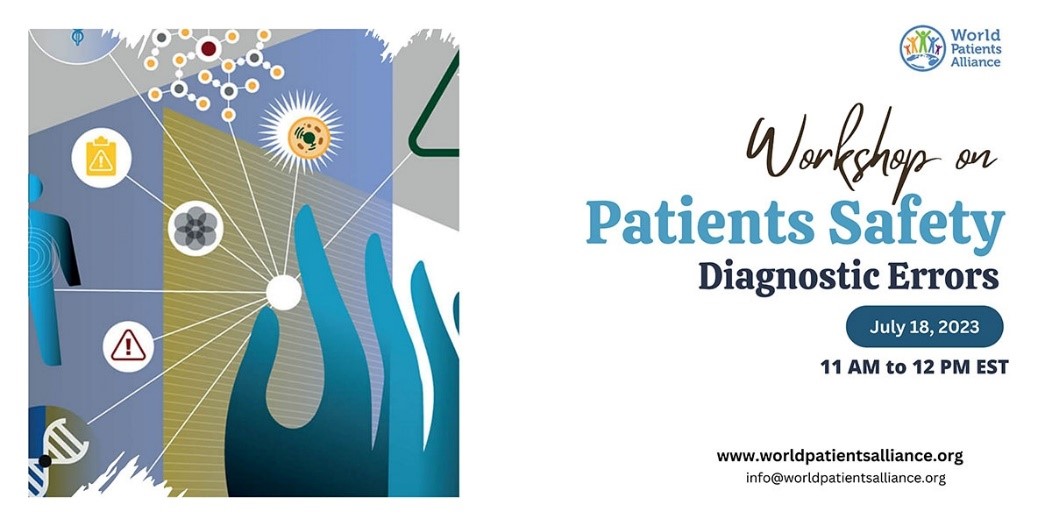
Workshop on Patients Safety: Diagnostic Errors
Diagnostic error is the failure to establish an accurate and timely explanation of the patient’s health problem(s) or failure to communicate that explanation to the patient. The global burden of diagnostic errors is significant and has far-reaching implications for patients, healthcare systems, and society as a whole. Patient engagement plays a vital role in mitigating diagnostic errors by leveraging the unique knowledge, perspectives, and experiences of patients. Collaborative decision-making and open communication can significantly enhance the accuracy and quality of diagnostic processes, leading to improved patient care.
WPA organized a workshop on diagnostic errors and invited leading healthcare providers and patient advocates to share their insights on the global burden of diagnostic errors and how these can be reduced.
The workshop was moderated by Helen Haskell, Chair, Patient Safety and Quality Council WPA and President, Mothers Against Medical Error, who introduced the workshop and welcomed the speakers. The first speaker of the workshop was Hardeep Singh, MD, MPH, Chief Health Policy, Center for Innovations in Quality, Effectiveness and Safety, Michael DeBakey Veterans Affairs Medical Center, Baylor College of Medicine, USA, who presented on the topic “Diagnostic Errors: The Problem, The Progress and the Opportunities.” Dr. Singh defined diagnostic errors and preventable diagnostic harm and shared their frequency in outpatient care, along with statistics on the most frequently missed diagnoses among 583 physician-reported cases. He also spoke about the various factors contributing to diagnostic errors including undertesting, perception error and misinterpretation of tests, and lack of communication and patient engagement. He later defined diagnostic excellence and its parameters in a healthcare and clinical setup. He laid out milestones to be followed by both patients, caregivers and healthcare providers to ensure that everything is in place and diagnosis process is monitored. He advised all physicians to learn from patients’ narratives. He then laid out four strategies for diagnostic safety and shared the AHRQ toolkit for engaging patients to improve diagnostic safety.
The next presentation was by Helen Haskell, President of Mothers Against Medical Error and Chair of the WPA Patient Safety and Quality Council. She presented on “Patient Engagement in Diagnosis: Communication and Shared Understanding.” Helen spoke about common diagnostic problems from the patient’s point of view and shared her personal experience in which diagnostic errors caused the loss of the life of her beloved son Lewis. She emphasized the importance of effective and timely patient engagement and involvement in the process of diagnosis and concluded with sharing the patient toolkit developed by the Society to Improve Diagnosis in Medicine.
The next presentation was by Nagwa Metwally, a prominent Egyptian patient advocate and Patient for Patient Safety Champion, who shared her experiences and insights in a talk entitled “Diagnostic Errors: Patient Perspective.” Nagwa narrated the experience of a pregnant woman whose life and that of her newborn were lost because of diagnostic errors. The reasons were lack of communication, ignorance of warning signs coupled with unwillingness to search more, delays in consultations, and poorly monitored processes. Nagwa was followed by Margaret Murphy, Patient for Patient Safety Champion from Ireland, a leading patient advocate whose beloved son Kevin lost his life because of diagnostic errors. She presented “Diagnostic Errors: Delayed Diagnosis Making Rescue Impossible.” Margaret shared the case history of her son, whose life could have been saved had it not been for his healthcare providers’ inability to recognize and timely diagnose the problem. The factors that led to this tragic outcome included absence of communication with both family and senior consultants, no tracking of deterioration, ignorance of developing neurological problems and failure to timely engage the senior consultants etc.
The presentations were followed by panel discussions among the speakers followed by a Q&A session whereby around 175 participants addressed various questions to the speakers and the speakers replied with enthusiasm.
Hussain Jafri, Founding Director WPA, concluded the workshop, commenting that the workshop had been extremely educational and inspirational and had broadened our understanding of the burden of diagnostic errors and how they impact patients and also society and healthcare systems. We also learnt that patient engagement plays a vital role in mitigating diagnostic errors by leveraging the unique knowledge, perspectives, and experiences of patients. Collaborative decision-making and open communication can significantly enhance the accuracy and quality of diagnostic processes, leading to improved patient care. Hussain thanked the speakers for their informative presentations before closing the workshop.
Agenda

Speakers
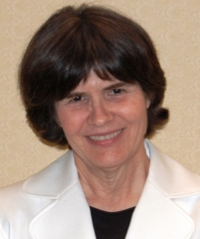
United States
Since the medical error death of her young son Lewis in 2000, Helen Haskell has worked to bring the patient voice to healthcare safety and quality. Helen is president of the American nonprofit patient organizations Mothers Against Medical Error and Consumers Advancing Patient Safety and is an Institute for Healthcare Improvement senior fellow. She is Chair of WPA Patient Safety and Quality Council and former co-chair of the WHO Patients for Patient Safety Advisory Group and a recently retired board member of the Accreditation Council for Graduate Medical Education and the Institute for Healthcare Improvement. She is a member of the board of directors of the International Society for Rapid Response Systems, the Patient Safety Action Network and is on the steering committee of Consumers United for Evidence-Based Medicine. She serves on many other boards and committees, including quality and safety committees at the National Quality Forum, AHRQ, and the Center for Medicare and Medicaid Services. She was a winner of Consumer Reports’ first National Excellence in Advocacy award in 2011 and was named by Modern Healthcare magazine as one of the “100 Most Powerful People in Healthcare” in 2009 and by Becker’s Hospital Review as one of 50 leaders in patient safety in 2015, 2016, and 2017. She has written numerous journal articles and patient educational materials on patient safety and patient engagement and is co-editor of an interprofessional textbook using patient narrative to teach patient safety and professional competencies. She has been featured in dozens of articles and videos on patient safety, including Transparent Health’s Lewis Blackman Story, shown in hospitals and medical and nursing schools across the world.
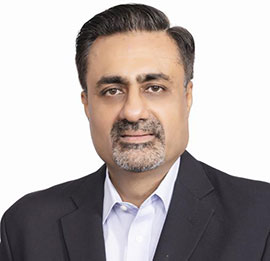
Pakistan
Hussain Jafri is the Executive Director of World Patients’ Alliance. He is also the Secretary General of Alzheimer’s Pakistan, the national association of Alzheimer’s disease and related dementias that Hussain founded in 1999 as a result of his experiences as a care giver for his grandfather with Alzheimer’s Disease. He has been very active in the field of patient safety and has remined the Vice Chair of Advisory Group of WHO’s Patients for Patients Safety Program (PFPS). Hussain has also founded Pakistan Patient Safety Initiative and has been working towards several patient safety initiatives. The Government of the Punjab has also nominated him the Provincial Focal Person on Patients Safety & Quality and given the responsibility of developing patients safety and quality services in the health sector of the Punjab province.
He has remarkable experience of working as a volunteer in the social sector and has had an opportunity of working with government, national and international non-profit organizations. Hussain is also a member of the Person and Family Centred Advisory Council (PFCAC) of International Society for Quality in Health Care (ISQua). Moreover, he is also a taskforce member of Global Alliance of Partners for Pain Advocacy (GAPPA). He is an experienced speaker and a resource person and has been presenting nationally and internationally on different issues like patient safety, patients centred healthcare, care giving, advocacy, partnership in health, organizational development, etc. Hussain is a PhD from University of Leeds, UK on prevention of genetic disorders. He is currently working as the Deputy Project Director of Punjab Thalassaemia Prevention Programme and has published several publications in international indexed journals.
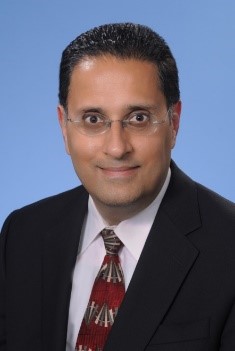
Michael E. DeBakey Veterans Affairs Medical Center / Baylor College of Medicine, USA
Hardeep Singh, MD MPH is a Professor of Medicine at the Center for Innovations in Quality, Effectiveness and Safety (IQuESt) based at the Michael E. DeBakey VA Medical Center and Baylor College of Medicine, Houston. He leads a portfolio of multidisciplinary patient safety research related to measurement and reduction of diagnostic errors in health care and improving the use health information technology. His research has informed several national and international patient safety initiatives and policy reports, including those by the US National Academy of Medicine, AHRQ, AMA, ACP, CDC, OECD and the WHO. He serves as a nominated member of National Academies' Board of Health Care Services and is an elected Fellow of the American College of Medical Informatics for significant and sustained contributions to the field of biomedical informatics. His contributions include co-developing the "ONC SAFER Guides" which provide national recommendations for safe electronic health record use, co-chairing or participating on several national panels and workgroups on measuring and improving safety and developing pragmatic resources and tools to promote patient safety and diagnostic excellence in clinical practice. He has received several prestigious awards for his pioneering work, including the Academy Health Alice S. Hersh New Investigator Award in 2012, the Presidential Early Career Award for Scientists and Engineers (PECASE) from President Obama in 2014, the VA Health System Impact Award in 2016 and the 2021 John M. Eisenberg Patient Safety and Quality Award for Individual Lifetime Achievement.
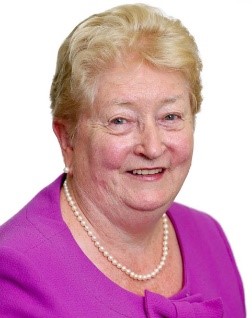
Following the death of her son as a result of medical error, Margaret Murphy has been actively involved as a patient safety advocate. Margaret is former External Lead Advisor for the World Health Organization’s Patients for Patient Safety, a network of 400 patient safety champions from 52 countries with 19 collaborating organizations. The focus of her work relates to seeing adverse events as having the potential to be catalysts for change as well as being opportunities for learning, identifying areas for improvement and preventing recurrence. She promotes this viewpoint at local, national and international levels as an invited presenter to conferences, hospital staffs and students. Her area of particular interest is education as a vehicle to achieve sustainable culture change. She holds three honorary doctorates, awarded by Queens University in Ontario, Queens University in Belfast and University College Cork.
Viewed as a resource for including the patient perspective in a variety of initiatives and a range of fora, Margaret has been invited to partner and collaborate in the areas of:
• Policy-making (Commission on Patient Safety & Quality Assurance and implementation steering group; member HSE National Risk Committee)
• Standard-setting (HIQA working group)
• Regulation (lay member, Irish Medical Council and serving on a number of committees),
• Education (Lectures to students – medical, nursing, radiation therapy, pharmacy, etc.)
• Research (Collaborator on EU Research Projects; Assessor final stage applications for NIHR funding)
• Conference speaker – often keynote (conferences, healthcare staffs, seminars, learning sets)
• Team member critical incident reviews
• Designated as one of seventy ISQua Experts in 2012
• Invited by Prof. the Lord Darzi of Denham to join an advisory group to scope, research and develop a paper on the subject of patient empowerment and make recommendations to senior policy makers for presentation at the Global Health Policy Summit, Doha, 2013 and again in 2015.

Nagwa Metwally is a seasoned health professional with decades of experience in the public health sphere on both national and international levels. She was a founding partner of the Patient Safety Alliance in Egypt in 2005 and has been a WHO patient safety champion since the same year. She has a long history of active leadership in women’s organizations and was an elected president of African Women in the United Nations. She is a former member of the Supreme Council of the Egyptian Red Crescent and was Chairman of the Red Crescent Committee in Ain Shams hospitals tasked with overseeing and improving the quality of medical services across the facilities. She is currently the Red Crescent representative to the Economic, Social & Cultural Council of the African Union. She is a member of the WHO Patients for Patient Safety Advisory Group and serves on the steering committee for preparation for the 2023 World Patient Safety Day. She holds a BA in Journalism from Cairo University and a MA in Mass Communication from the International Institute of Journalism India.

